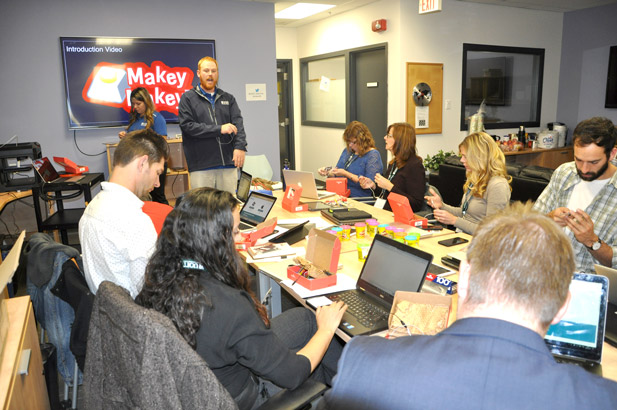The future of learning: Children, makerspaces and digital literacies
Dr. Janette Hughes explores role of digital technologies in education
November 11, 2016

One-sixth of the way through the 21st century, Canadian education researchers and policy makers continue to try and articulate the learning competencies (i.e. knowledge, skills and attitudes) students need to develop and be able to apply toward successful learning, living and working.
Although several provinces work to define these competencies, a national vision regarding what 21st-century learning should entail has yet to be developed. One educational approach gaining momentum as a way to help students develop required competencies is the ‘maker movement’, which focuses on project- and problem-based learning, design thinking and remixing practices. An example of remixing design or digital texts and putting them together to create a new product is the song parody of U.S. presidential candidates singing The Time of My Life to each other at an October 2016 debate.
“Effective learning is more complex than simply developing traditional, but still very important, literacy and numeracy skills: there is a wide range of other skills children need to master,” says Janette Hughes, PhD, Canada Research Chair in Technology and Pedagogy at the University of Ontario Institute of Technology (UOIT). “In an era of mass consumerism, we want students to be responsible consumers of digital texts and products, and be able to produce them across a range of media for particular purposes and needs.”
Dr. Hughes, a teacher herself for 18 years, says we’ve moved well beyond the question of whether digital media should be infused into learning: it’s a matter of identifying how this is best done in practice.
“Being literate has traditionally meant the ability to read and write, which certainly involves cognitive processes,” says Dr. Hughes, Associate Professor, Faculty of Education. “Digital literacies, computational skills and interpersonal/social processes are recognized essential elements. Although digital technologies are part of our daily lives, few people create them. There are increasing calls from industry and government for schools to empower students to manipulate and create technology to their advantage.”
Dr. Hughes, whose research is housed in the Faculty of Education’s STEAM-3D Lab, works with 11 English-language and French-language school boards across Ontario on new educational approaches to develop maker pedagogies and makerspaces. She also collaborates with the Ontario Ministry of Education and the Council of Ontario Directors of Education.
“This provincial investment in schools, teachers and students will help increase student capacity in STEAM education, and a society where students will be able to participate and lead in the digital and knowledge economies of the decades ahead,” says Dr. Hughes. “The final written report will be accompanied by a documentary that will highlight the establishment and implementation of makerspaces in 11 different schools. It will also include a professional development guide connected to the Science 3D: Discovery, Design and Development school-based inquiry projects that were created and implemented.”
What is a ‘makerspace’?
A makerspace is a dedicated learning space where students take ownership of their education by creating and building in a collaborative, hands-on environment. Makerspaces often include access to the latest digital tools–equipment such as 3D printers and scanners, green screens, tablets, e-textiles, programmable robots and augmented reality. Sometimes makerspaces are called ‘fab labs’: places where students can fabricate and create things in a group environment.
The inherent culture distinguishes a makerspace from a place where people make ‘stuff’. A makerspace is much more than the equipment it houses. It should be committed to a culture of innovation, while at the same time providing the skills and foundation that students will need to succeed in that kind of learning environment. A maker culture promotes risk-taking, learning from mistakes, problem-solving and the development of perseverance when tasks are difficult.
What is a ‘pedagogy’?
Pedagogy refers to the methods and practices of teaching, particularly as an academic subject or theoretical concept.
What is ‘STEAM’?
STEAM is an acronym standing for the collective educational components of Science, Technology, Engineering, Arts and Mathematics.
Media contact
Bryan Oliver
Communications and Marketing
Ontario Tech University
905.576.6551
bryan.oliver@uoit.ca



